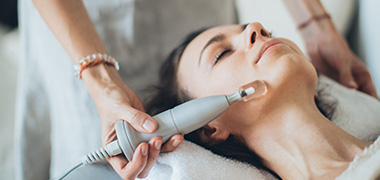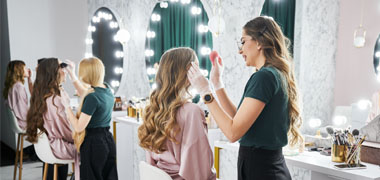
How do I become a special effects makeup artist?
Diploma of Screen and Media (Specialist Make-up Services)
- There are no mandated entry requirements.


Advanced Diploma of Screen and Media (Specialist Make-Up Services)
- There are no mandated entry requirements.
 The Makeup Technicians
The Makeup Technicians
Certificate IV in Screen and Media
- There are no mandated entry requirements.





Certificate IV in Screen and Media (Specialist Make-Up Services)
- There are no mandated entry requirements.


Related occupations
Nail Technician
Nail Technicians provide manicures, pedicures, and nail enhancements, creating art designs, selling products, and maintaining equipment in salons.
Beautician
Beauticians enhance clients' appearance through treatments like facials, massages, and makeup, with diverse career paths available.
Eyelash and Eyebrow Technician
Eyelash and Eyebrow Technicians offer services like extensions, tinting, shaping, and threading, while managing salon tasks and maintaining equipment hygiene.
Waxing Therapist
Waxing Therapists remove body hair with hot and strip wax, providing aftercare while working in salons, spas, or mobile services.
Spa Therapist
Spa Therapists provide body and relaxation treatments in various wellness settings, focusing on client indulgence and maintaining a serene environment.
Laser Therapist
Laser Therapists use non-ionising radiation for skin treatments, tattoo removal, and hair removal, consulting clients to tailor effective laser programs.
Dermal Therapist
Dermal Therapists carry out laser treatments, chemical resurfacing, and skin therapies, collaborating with medical professionals in clinics and spas.
Beauty Therapist
A Beauty Therapist provides beauty treatments, assesses client needs, and offers product advice, requiring strong communication skills.
Cosmetic Nurse
Cosmetic Nurses perform beauty treatments, provide client assessments and advice, requiring strong communication, customer service, and time management skills.
Makeup Artist
Makeup Artists enhance beauty using cosmetics for various events, create special effects for film and theatre, and design prosthetic masks.
Hair and Makeup Artist
A Hair and Makeup Artist creates specific looks for performers in film, TV, and theatre, adapting techniques for various productions.
Dermal Clinician
A Dermal Clinician performs non-surgical cosmetic skin treatments, including laser procedures, to address various patient concerns.
IPL and Laser Technician
An IPL and Laser Technician performs cosmetic skin treatments using light and laser therapies to address various patient concerns.
Electrologist
An Electrologist uses electrical currents for hair removal, conducting consultations and ensuring high hygiene standards in beauty clinics.
Skin Therapist
A Skin Therapist assesses skin conditions and provides treatments like facials and chemical peels to enhance clients' skin health.
Clinical Aesthetician
A Clinical Aesthetician provides specialised skin treatments, using advanced techniques to enhance clients' appearance and address skin concerns.
Common questions
How much does a Special Effects Makeup Artist earn?
In Australia, a full time Special Effects Makeup Artist generally earns $1,350 per week ($70,200 annual salary) before tax. This is a median figure for full-time employees and should be considered a guide only. As you gain more experience you can expect a potentially higher salary than people who are new to the industry.
What are the job opportunities for a Special Effects Makeup Artist?
The number of people working in this industry has grown strongly over the last five years. There are currently 2,500 people employed as a make up artist in Australia and some of them specialise as a Special Effects Makeup Artist. Special Effects Makeup Artists may find work in larger towns and cities where media productions are based.
Source: Australian Government Labour Market Insights
How do I become a Special Effects Makeuip Artist?
If a career as a Special Effects Makeup Artist interests you, consider enrolling in a Certificate IV in Screen and Media (Specialist Make-Up Services). This course will prepare you to apply makeup and hair effects for movies and television productions. You could also further your studies with a Diploma of Screen and Media (Specialist Make-Up Services).
Further reading


Choosing a security licence course in Australia: A step-by-step guide for jobseekers
10th November 2023)

